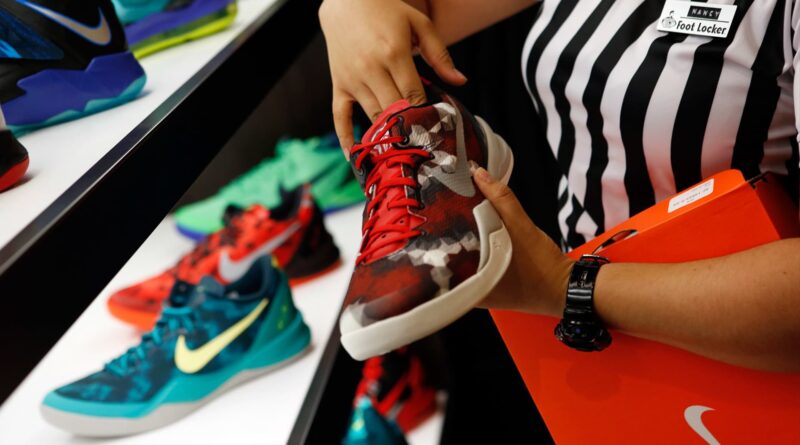How Foot Locker is waging a comeback after its breakup with Nike
An worker arranges Nike basketball footwear on show on the Home Of Hoops by Foot Locker retail retailer on the Beverly Heart in Los Angeles.
Patrick T. Fallon | Bloomberg | Getty Pictures
Throughout a latest occasion celebrating Foot Locker’s fiftieth anniversary in New York Metropolis, it was exhausting to think about that the legacy sneaker chain was showing on chapter watch lists as just lately as March.
Grammy-nominated rapper Coi Leray was there to have a good time the corporate with a particular efficiency of her hit track “Gamers” as influencers, journalists and handpicked members of the corporate’s revamped loyalty program sipped on lavender margaritas and champagne cocktails.
Workers – and never simply these within the glare of the corporate’s PR crew – gushed about CEO Mary Dillon as Adidas staffers celebrated the corporate’s new retailer design, which showcases individual brands as a substitute of blending them on nondescript shoe partitions.
Foot Locker turns 50 whereas on a little bit of an upswing two years into Dillon’s tenure as CEO. Final month, it launched fiscal second-quarter outcomes and full-year steerage that beat expectations, as comparable gross sales grew for the first time in six quarters.
As Foot Locker revamps its sprawling retailer footprint, and perhaps benefits from some good timing, it is making strides in profitable again its vital model companions like Nike and Adidas, the latter of which co-hosted the Monday evening occasion and helped safe Leray’s efficiency.
Coi Leray performs at Foot Locker fiftieth anniversary occasion on September 16, 2024 in New York.
Courtesy: Mike Vitelli and Isabella Picicci
“Our final quarter was a extremely good indication that the exhausting work that we have been placing into the Lace Up plan is working, and that makes me really feel actually, actually nice, as a result of I actually see the subsequent 50 years of development for Foot Locker and our future,” Dillon instructed CNBC in an interview, referencing the corporate’s turnaround plan. “I actually suppose that there is layers of class development that we will drive by simply making sneakers that rather more inclusive, that rather more enjoyable, that rather more straightforward to entry.”
However as Foot Locker stares down the subsequent 50 years, the corporate remains to be at a crossroads and should reply some elementary questions: can it as soon as once more be the market chief in sneakers, and might it not simply survive, however thrive, as manufacturers rely much less and fewer on wholesalers?
“With the mixture of extra direct to client from the manufacturers, the deepening of specialists like [Dick’s Sporting Goods], the incursion of JD Sports, Foot Locker nonetheless appears dangerous,” mentioned Neil Saunders, a retail analyst and managing director of GlobalData. “In some methods, they’re only a kind of distributor of everybody else’s merchandise.”
Dick’s has a giant private-label enterprise and sells different classes like sporting items, whereas JD Sports activities has robust loyalty applications and a sturdy trend enterprise, he mentioned.
“Whereas Foot Locker appears susceptible as a result of it simply would not have all these different strings to its bows,” mentioned Saunders. “The reality is that though they’re getting higher, there may be nonetheless this query: Do we want this specialist sneaker retailer?”
From mall legend to has been
Foot Locker will be traced again to the legendary retailer Frank Winfield Woolworth, whose namesake firm branched into footwear within the Sixties and later opened the primary Foot Locker in Metropolis of Trade, California, in September 1974.
From the start, Foot Locker was a mall retailer. Over the subsequent 20 years, it opened 1000’s of shops in malls throughout the U.S. and overseas.
By the flip of the century, it was the world’s largest retailer of athletic footwear and attire, with a 20% market share within the U.S., in keeping with a 2002 Forbes report. It was the first place to purchase Nike sneakers and was accountable for 26% to twenty-eight% of Nike’s whole home income. Nike accounted for greater than half of Foot Locker’s whole gross sales on the time.
“It was a less complicated retail world. I believe within the years that they had been initially actually experiencing robust development, it was so simple as being within the mall, having a big mall footprint and having the precise manufacturers and so they had that footprint,” mentioned Janine Stichter, a retail analyst and managing director at BTIG, who has been overlaying the retail business since 2008. “They had been the No. 1 companion of Nike. Nike, on the time, was robust and rising, and I believe they had been actually seen as just like the vacation spot in an setting that was quite a bit much less aggressive.”
When Foot Locker’s chief industrial officer, Frank Bracken, joined the corporate in 2010, the retailer’s relationship with Nike was poised to get even stronger. By the tip of the last decade, 75% of the merchandise Foot Locker bought had been from Nike.
“This was [pre-direct-to-consumer], Foot Locker was positively ‘most favored nations’ with most of our model companions at the moment, Nike was about to go on a reasonably epic run alongside Jordan, and so I really joined at a extremely good time,” Bracken mentioned in an interview.
Bracken recalled how from 2012 to about 2018, Foot Locker’s inventory rose to report highs as income grew at a mid-to-high single-digit compound annual development price. However because the 2020s neared, the corporate obtained “complacent” and started taking its place because the market chief in sneakers “without any consideration,” mentioned Bracken.
“[We] obtained some weak indicators about the place the business was headed, from our companions and from competitors, after which Covid, you understand, paralyzed all people momentarily and I believe we misplaced a while, candidly, throughout Covid,” he mentioned. “Competitors used it as a possibility to put money into expertise and functionality and the enterprise, and perhaps we in all probability stood a bit bit too nonetheless at that time limit.”
As customers moved on-line and away from malls, Foot Locker did too little to replace its e-commerce capabilities and its actual property footprint, mentioned Bracken. On the similar time, opponents had been getting larger and savvier, adjusting their actual property methods as malls throughout America sputtered and died.
In North America, the corporate let its banners — Foot Locker, Footaction and Champs Sports activities — overlap too closely with one another when it comes to assortment, location and advertising and marketing, and types “began to pay attention to that,” mentioned Bracken.
On the finish of 2021, Foot Locker was winding down its Footaction enterprise and had acquired WSS – an off-mall athletic attire retailer that caters to the Hispanic neighborhood – to assist differentiate itself from opponents.
However by then, it was too late.
Nike, finishing up a brand new technique to chop off wholesalers and sell directly to consumers by way of its personal web sites and shops, had began reducing the number of sneakers it was promoting to Foot Locker, the corporate mentioned on an earnings name in February 2022. It selected as a substitute to order its greatest merchandise for Foot Locker’s main opponents: Dick’s and JD Sports activities.
For an organization that relied virtually solely on Nike, the change was devastating and posed an existential menace. By the tip of fiscal 2022, comparable gross sales had fallen 7.2% in North America. The declines would solely mount within the quarters to come back.
A brand new chief arrives
When Dillon, the previous CEO of Ulta Beauty, took the helm of Foot Locker in September 2022, Wall Road breathed a collective sigh of reduction. Extremely regarded amongst friends, Dillon was recognized for her capability to win over manufacturers, and appeared to have the required chops to show Foot Locker round.
“In a manner, she soothed buyers … they know that she will be able to ship and so they know that she understands retail and the sector and she or he’s obtained good operation management and all the remainder of it,” mentioned Saunders from GlobalData. “That is clearly beginning to come by way of a bit bit extra now.”
In her first main public occasion as CEO, Dillon hosted an investor day final March the place she touted a revitalized relationship with Nike. She pledged the “fruits of our renewed dedication to 1 one other” would start to point out up in outcomes by the tip of the 12 months.
She outlined her Lace Up turnaround technique, which targeted on 4 key pillars: higher advertising and marketing, a brand new actual property plan, a revamped loyalty program and an emphasis on on-line gross sales.
However because the 12 months wore on, the macroeconomic image worsened, which hit Foot Locker exhausting as a result of about half of its clients are thought of low earnings. The corporate went on to chop its steerage twice, droop its dividend and delay a key financial target that it outlined at its investor day.
“As a CEO, it is exhausting to exit and make a dedication and have to vary it, however as a result of I consider a lot within the plan and the place we’re heading, I felt assured that it was the precise factor to do,” mentioned Dillon. “Now I consider we have form of labored previous that.”
Past the macro state of affairs, the corporate possible underestimated the challenges it was dealing with, and the way a lot the Nike breakup would damage its enterprise, Saunders and Stichter mentioned.
“You do not actually know till you do it how impactful that is going to be and I believe that they thought they’d be capable of offset extra of that loss extra shortly,” mentioned Stichter.
Indicators of a turnaround
Whereas Foot Locker’s fiscal 2023 turned out worse than it initially anticipated, the corporate is seeing a few of its turnaround efforts begin to take maintain. Whereas Nike remains to be its largest companion, it is focusing extra on different manufacturers, corresponding to upstarts like Hoka and On and legacy incumbents like Birkenstock and Ugg.
On-line gross sales are rising. Foot Locker plans to relaunch its cell app on the finish of the 12 months, and it just lately unveiled its revamped loyalty program FLX, which permits clients to earn reductions, entry to product launches and perks like free returns.
“We all know that we solely seize a fraction of this annual sneaker spend that our present clients spend on sneakers,” mentioned Kim Waldmann, Foot Locker’s chief buyer officer. “[FLX] is not essentially about getting you to purchase 10 extra sneakers per 12 months, it is a possibility for us to drive share of pockets consolidation by the truth that you are getting worth again in buying with us.”
When Waldmann began within the function final 12 months, she realized from client analysis that clients beloved getting access to all kinds of manufacturers at Foot Locker’s shops and loved the product information that its staff, often known as “Stripers,” had.
“The factor that they needed to see extra from us is like we’re simply not prime of thoughts. A number of customers simply hadn’t seen us shortly,” mentioned Waldmann. “And I believe that was actually the chance to take what’s an iconic model and make it influential and prime of thoughts once more, and that is actually the work that we have been doing.”
The corporate is advertising and marketing extra towards girls and has partnered with stars corresponding to Leray, who was a part of Foot Locker’s spring fashion and development marketing campaign.
Maybe most critically, Foot Locker is lastly doing the work essential to overhaul its aging store fleet, which is accountable for about 80% of its gross sales. Since Dillon took over, she’s closed round 500 shops, opened about 200 new retailers and transformed or relocated one other 200 or so doorways. Earlier this 12 months, Foot Locker unveiled its “reimagined” store concept and its plans to maneuver away from its conventional format, which tends to be two partitions of footwear with a center part used for attempting on sneakers.
Foot Locker retailer location on thirty fourth road in New York Metropolis.
Courtesy: Foot Locker
As increasingly manufacturers move away from wholesalers in favor of their very own shops and web site, the technique change was vital to Foot Locker’s survival. Its enterprise doesn’t work if it would not have the help of its model companions, which need to be sure that their assortments are showcased individually – not blended along with opponents.
“Whenever you speak to an organization like On they’re like, yeah, we’re selective about who we promote to, we do not need to be simply one other shoe on the wall,” mentioned Stichter. “They’re actually investing behind placing extra signage and simply investing within the shows … that is what makes the manufacturers need to work with them.”
Since Might, Foot Locker has introduced the brand new design idea to at the least 80 of its shops, which it says have higher comparable gross sales and margins in contrast with the steadiness of the chain. The corporate is working to refresh two-thirds of its world Foot Locker and Youngsters Foot Locker doorways by the tip of 2025, and mentioned 40% of its North American footprint is now off-mall.
The brand new retailer strategy could not come at a greater time for Foot Locker. Over the past 12 months, Nike has begun to stroll again its direct promoting technique after acknowledging that it went too far in reducing out wholesalers.
“Nike is our largest companion and so they’re the most important within the business so for us, it is also about, how can we make it possible for we’ve got a extremely terrific long-term development relationship with Nike? And I am proud about the truth that we’re going again to development [with Nike] beginning within the fourth quarter of this 12 months,” mentioned Dillon. “Additionally … on the similar time, Nike has been very public in regards to the function of shops and the significance of that for them as nicely so perhaps it was good timing, proper?”
The battle between extinction and survival
As Foot Locker appears forward to the subsequent 50 years, its capability to outlive remains to be up for debate. Nike is at a low point and is cozying again as much as the wholesale companions, however when it rebounds, will it reduce off these retailers as soon as once more?
Absent a sturdy private-label enterprise, Foot Locker’s success can be extremely depending on the efficiency of its model companions, which leaves it with much less management over its personal future than different retailers which have just lately made big comebacks, corresponding to Abercrombie & Fitch.
If Nike has a serious product launch, it may be a boon for Foot Locker’s gross sales, but when innovation dries up, Foot Locker will endure. It has discovered itself in an identical quandary dealing with different multi-brand retailers, corresponding to Macy’s, which has additionally struggled to find itself in a post-mall world.
When requested if Foot Locker can survive one other 50 years, GlobalData’s Saunders mentioned the corporate is the “most vulnerable to extinction” of its friends. Stichter disagreed.
“One factor we have realized is that customers actually do need a multi-brand expertise. There are individuals who go to Nike.com or Adidas.com however folks actually like having that choice, having the service,” mentioned Stichter. “So there’s a cause for an idea like Foot Locker to exist. I believe all of it simply depends upon, can they execute nicely and be one of many most well-liked locations for customers who’re searching for selection.”





